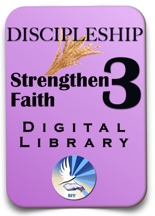
Redemption Through The Scriptures: The Purpose for Redemption
The Change of Covenants
Paul J. Bucknell
Purpose | Curtain | Closer | Two Covenants | Mosaic Covenant |
Belonging | Change of Covenants | New Covenant | Fellowship | Questions
God’s Purpose for His People
God has higher goals in sending Jesus to die for us than we normally think. This incomplete perspective greatly weakens our trust of His involvement in our lives. Learning these two major purposes, on the other hand, will certainly help you rethink your Christian lives!
The Change of Covenants
The term ‘new covenant’ isn’t completely a Christian phrase as it was first used in Jeremiah 31:31. The Lord hints at the inadequacy of the Mosaic covenant both in terms of the limited intimacy but also with the limitations of the covenant itself–they broke it. Hebrews 8:13 states, “When He said, “A new covenant,” He has made the first obsolete. But whatever is becoming obsolete and growing old is ready to disappear.”
“Behold, days are coming,” declares the LORD, “when I will make a new covenant with
the house of Israel and with the house of Judah, not like the covenant which I made with
their fathers in the day I took them by the hand to bring them out of the land
of Egypt, My covenant which they broke, although I was a husband to them,
“declares the LORD. 
“But this is the covenant which I will make with the house of Israel after those days,” declares the LORD, “I will put My law within them, and on their heart I will write it; and I will be their God, and they shall be My people” (Jeremiah 31:31-33).
The book of Hebrews in the New Testament picks up on this important theme. Before noting the differences between the two covenants in the next section, think how strange this is. Why would God make a new and better agreement when they rejected His offer found in the old one? Would God want to be near to a people who despised His glorious power and love?
He was kind enough with the first covenant. Though spurned, He went on and sought to bring the people of God even closer to Him to work along with Him. He does exactly the opposite to what most of us would do. This is grace extreme!
 Another thread is revealed through the heightened extension of
God’s kind patience. The Hebrew word chesed translated in the NASB as lovingkindness’ (joins two senses of love and
kindness together) is used 175 times in the Old Testament. This word and its
sense is in the New Testament Greek words with words like love, mercy (used 54
times) and grace (114 times).
Another thread is revealed through the heightened extension of
God’s kind patience. The Hebrew word chesed translated in the NASB as lovingkindness’ (joins two senses of love and
kindness together) is used 175 times in the Old Testament. This word and its
sense is in the New Testament Greek words with words like love, mercy (used 54
times) and grace (114 times).
Instead of avoiding the people of God, the Lord established a more splendorous plan in the New Covenant, one which no one deserved or could anticipate. It was not just new but more special.
Next -> The New Covenant
info@foundationsforfreedom.net
Scriptures typically quoted from the New American Standard Bible unless noted:
(C) Copyright The Lockman Foundation 1988










